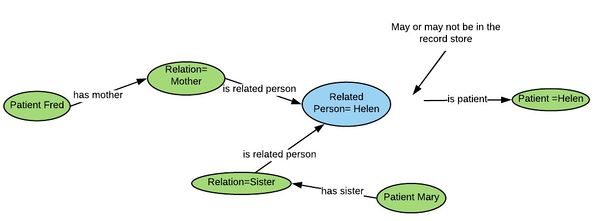DavidStables (talk | contribs) No edit summary |
DavidStables (talk | contribs) No edit summary |
||
| Line 2: | Line 2: | ||
# An ontology of relationships, using relationship types and person relation subclasses, the latter being aligned with the Snomed-CT 'Person' class. | # An ontology of relationships, using relationship types and person relation subclasses, the latter being aligned with the Snomed-CT 'Person' class. | ||
# The data model, whereby a related person is linked to another person via a relationship type and relation entity, the latter being aligned with the above | # The data model, whereby a [[related person]] is linked to another person via a relationship type and relation entity, the latter being aligned with the above | ||
As with the common information model in general, the two are related to each other so an enquirer can build sophisticated relationship queries and advanced family trees. | As with the common information model in general, the two are related to each other so an enquirer can build sophisticated relationship queries and advanced family trees. | ||
| Line 10: | Line 10: | ||
For example a "mother" is a type of person who is a mother of somebody. A son "has a mother" who is a mother. However, the same person who is a mother may also be a "sister" (whether or not the relationship to her sister has been authored. | For example a "mother" is a type of person who is a mother of somebody. A son "has a mother" who is a mother. However, the same person who is a mother may also be a "sister" (whether or not the relationship to her sister has been authored. | ||
Consequently there is a need, not only to model the relationship between people using a sub property of "related to", but also to model the relation. In addition a related person may or may not be a patient or person recorded in the record store. It may be someone unknown or abroad and there may be little information on them other than a contact detail. Therefore the related person also has to be modelled as an entity. | Consequently there is a need, not only to model the relationship between people using a sub property of "related to", but also to model the relation. In addition a related person may or may not be a patient or person recorded in the record store. It may be someone unknown or abroad and there may be little information on them other than a contact detail. Therefore the related person also has to be modelled as an entity. This can be illustrated as follows: | ||
[[File:Related person.jpg|center|thumb|600x400px]] | [[File:Related person.jpg|center|thumb|600x400px]] | ||
This can be illustrated as follows: | This can be illustrated as follows: | ||
Revision as of 16:33, 19 May 2020
Family relationships and relationships between people, are included in the common information model in two main ways:
- An ontology of relationships, using relationship types and person relation subclasses, the latter being aligned with the Snomed-CT 'Person' class.
- The data model, whereby a related person is linked to another person via a relationship type and relation entity, the latter being aligned with the above
As with the common information model in general, the two are related to each other so an enquirer can build sophisticated relationship queries and advanced family trees.
Relationships are complex because of the language is used.
For example a "mother" is a type of person who is a mother of somebody. A son "has a mother" who is a mother. However, the same person who is a mother may also be a "sister" (whether or not the relationship to her sister has been authored.
Consequently there is a need, not only to model the relationship between people using a sub property of "related to", but also to model the relation. In addition a related person may or may not be a patient or person recorded in the record store. It may be someone unknown or abroad and there may be little information on them other than a contact detail. Therefore the related person also has to be modelled as an entity. This can be illustrated as follows:
This can be illustrated as follows:
